Category: music
You are viewing all posts from this category, beginning with the most recent.
10 Albums, 10 Days: Silly Songs with Larry
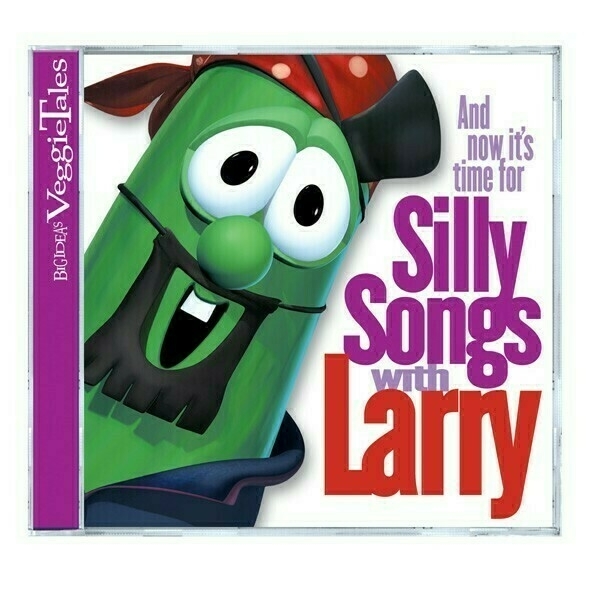
I got tagged on Facebook to do this project – share ten albums that greatly influenced my taste in music. One album per day for ten consecutive days. In theory for the Facebook version this is supposed to be without explanation… but I want to explain! So I’m going to blog the explanations here.
I started writing today’s post thinking I was going to write about a classic jazz album. One that everybody would recognize, and that is a favorite of mine for the same reason it’s a favorite of many, many people. But then I got to thinking - was it really formative for me? Probably not. And then this album sprang to mind and insisted that it be added to the list. Bear with me.
And now it’s time for Silly Songs with Larry, the part of the show where Larry comes out and sings a silly song. So, without further ado, Silly Songs with Larry.
Veggie Tales were just becoming a thing in my late high school years, and I didn’t have any familiarity with them until I hit college. Then one night I was with a church group at someone’s home and they had a Veggie Tales video on for the kids and I heard a (non-silly-song) rhyme that stopped me in my tracks. The king’s advisers are trying to figure out how to get rid of Daniel, and they include these lines:
We could use him as a footstool or a table to play Scrabble on
Then tie him up and beat him up and throw him out of Babylon
Wait, what’s that? Somebody with the nerve to rhyme “Scrabble on” with “Babylon” without blatantly winking at the camera while doing so? This is someone I needed to pay more attention to. So then I bought the Silly Songs with Larry CD, and it was all downhill from there.
This CD got dozens of plays at our house before we had kids old enough to listen to it. Heck, before we even had kids. I am a sucker for wordplay. This love would take me later to Weird Al Yankovic, and then to quickly embrace Lin-Manuel Miranda’s Hamilton. But before that was Phil Vischer and his silly songs.
Over the years the phrases have become engrained in our family’s vocabulary. “Oh where is my hairbrush?” “Where’s my water buffalo? Why don’t I have a water buffalo? Are you prepared to deal with that? I don’t think so!” “Now the moral of the story, (it’s the point we hope we’ve made): if you go a little loopy, better keep your nurse well paid.” I led a sing-along of The Cheeseburger Song at the end of a church hymn sing one time. It was awesome.
I am overly proud of the fact that my children now display the same predilection to altering lyrics to songs. My oldest once sang original funny lyrics to Rewrite The Stars from The Greatest Showman at a karaoke night. (All my kids sang Weird Al at karaoke night.) I am always quick to make up a funny lyric when I can. And one of these days I’m gonna memorize all the Spanish so I can sing Larry’s part in Dance of the Cucumber.
10 Albums, 10 Days: Behold the Lamb of God
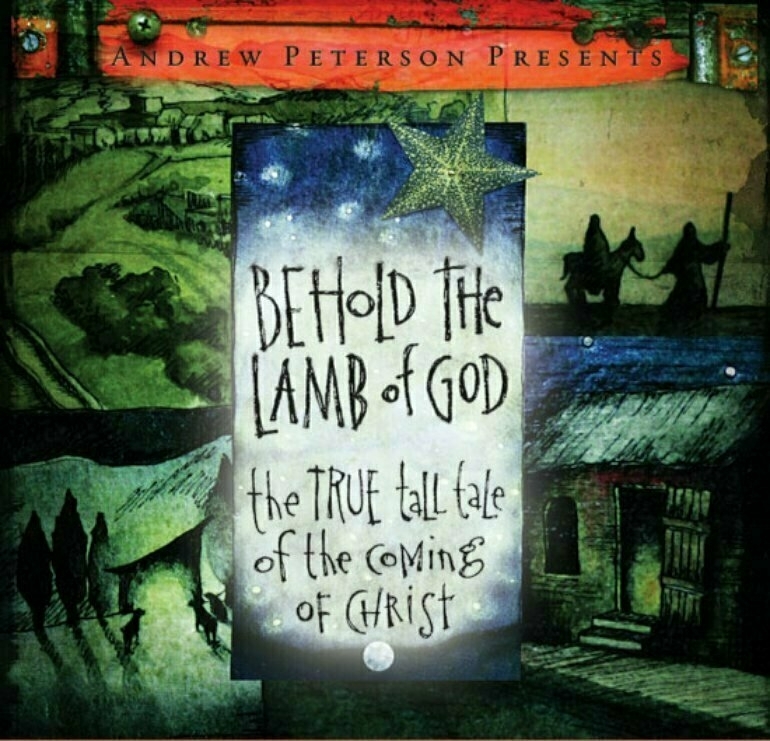
I got tagged on Facebook to do this project – share ten albums that greatly influenced my taste in music. One album per day for ten consecutive days. In theory for the Facebook version this is supposed to be without explanation… but I want to explain! So I’m going to blog the explanations here.
Yesterday I left off by saying that my Caedmon’s Call fandom led me to Andrew Osenga, who in turn led me to Andrew Peterson. Today it’s time to tell a little more of that story.
Andrew Osenga wasn’t an original member of Caedmon’s Call. He had a band called The Normals which opened for Caedmon’s on occasion. At some point after The Normals stopped making records, Andy was invited to join Caedmon’s. Once I became familiar with Andy as a member of Caedmon’s, I quickly picked up his two available solo CDs - an EP called Souvenirs and Postcards, and a full-length CD called Photographs. They quickly became favorites.
In late 2005 I caught wind (maybe on the Caedmon’s fan forum?) that Andy Osenga was coming to Iowa to play a show with Andrew Peterson at a little start-up Christian music festival on the side of a hill in Clermont, Iowa. So, my wife and I bundled up our one-year-old daughter and drove the 90 minutes up to hear them (along with Ben Shive) play a two-hour concert from a flatbed trailer on the side of the hill. It was, in retrospect, a really weird gig for them. As Peterson said at the time, “it’s the first time I’ve ever played a concert with somebody riding a cow in the background”. No joke. I was thrilled to meet them that day and a little extra happy when AO said he recognized me from the fan forum. (Did I mention I was a big fanboy?)

Andy Osenga on the left, me on the right. October 2005. We both still had hair.
But I’m telling a lot of stories and not getting to my album for today. Anyway, at that show I ran into a co-worker who was there to see Andrew Peterson play, and we visited a bit. Fast-forward a year or so and that co-worker emailed me. She was bringing Andrew Peterson and friends to town to play a concert. Would I be interested in helping out with it for the day? Well, that was a no-brainer. And that gave me my first opportunity to hear the Christmas record and tour that would become a tradition: Andrew Peterson’s Behold the Lamb of God.
What can I even say about this record? It’s a concept album that tells the story of Jesus from both the Old Testament and the New, with creative songwriting, smart lyrics, beautiful melodies, amazing musicianship, and a sense of humor. Every year for 20 years now Andrew Peterson and his friends have taken this record on the road for a series of concerts between Thanksgiving and Christmas. I think I’ve been 5 times? But nothing will compare to that first time I saw it in a high school auditorium in Cedar Rapids. I’d never heard the record before I hear them play it live that night.
This record is influential to me not just for the brilliant songs, but also because of how it represents Peterson’s commitment to artistic community. He toured with the same musicians for almost all of those 20 years. They were not just co-workers but friends. Peterson would later expand the vision of that community into The Rabbit Room. But none of that would’ve happened without him nurturing those relationships on tours built around this one amazing album.
10 Albums, 10 Days: Long Line of Leavers
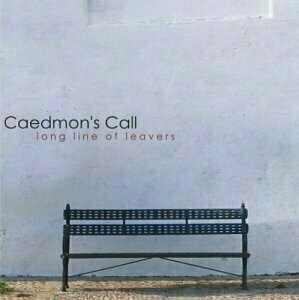
I got tagged on Facebook to do this project – share ten albums that greatly influenced my taste in music. One album per day for ten consecutive days. In theory for the Facebook version this is supposed to be without explanation… but I want to explain! So I’m going to blog the explanations here.
One pattern that shows up in this list is my propensity to discover an artist not at their first album and then work forward, but to discover a later album and then work my way back through their discography. As I did with Michael W. Smith in my teens, and as I would in my 30s with Arcade Fire, U2, and Radiohead, in my late 20s I did with a little band called Caedmon’s Call.
I know my brother had a copy of their self-titled album back when I was in college, and I’m sure I listened to it a time or two but it just didn’t click for me. In retrospect, this really irks me because Caedmon’s was playing great shows and doing fan community events in the Houston area when I was in college in East Texas… road trips would not have been out of the question. But I digress.
Fast forward to 2000 and I’m a young guy wandering the Christian book store (remember when those existed?) listening to demo CDs (or those?). On a whim I gave this CD a spin, and the acoustic guitar loop and B3 organ kicking off the title track sucked me in. And then there were little trumpet accents the second time through the intro riff, and I was completely hooked. (I would find out later that long-time Caedmon’s fans hated those trumpets, but what did I know? And again I digress.)
Long Line of Leavers sucked me in and never let me go. I don’t know that it’s Caedmon’s best record - but it’s also hard to classify best. Their self-titled record and follow-up 40 Acres have their classic acoustic sound, with some twisty Derek Webb lyrics thrown in for good measure. Later on, Share The Well (a concept album written and partially recorded in India) would bring a new level of maturity to their songwriting and production and set that record apart. But Long Line of Leavers was my gateway drug.
Finding this record and this band had more long-term impact on my life than probably any other record I’ll have on this list, save maybe for the one I’ll close with. Because after finding Caedmon’s and doing some internet searches to find out more about them, I stumbled upon a discussion forum run by and for Caedmon’s fans. I lurked there for a while. In 2004 I joined, picked an unintentionally hilarious username, and started posting. The other forum stalwarts became my friends. Through the years I have met many of them in person and deepened those friendships in meaningful ways. Their friends have become my friends. 16 years later they form a community I still interact with every day.
As a musician, I joke now that I learned everything I know about playing a B3 organ from listening to Caedmon’s Call. (There might in reality be a little bit of gospel music influence in there, too, but it’s mostly Caedmon’s.) Then Caedmon’s picked up a new guitar player named Andrew Osenga and I became a massive fanboy of his stuff for several years. And then Caedmon’s community pointed me to Andrew Peterson… but I’ll leave that story for tomorrow.
10 Albums, 10 Days: When Harry Met Sally
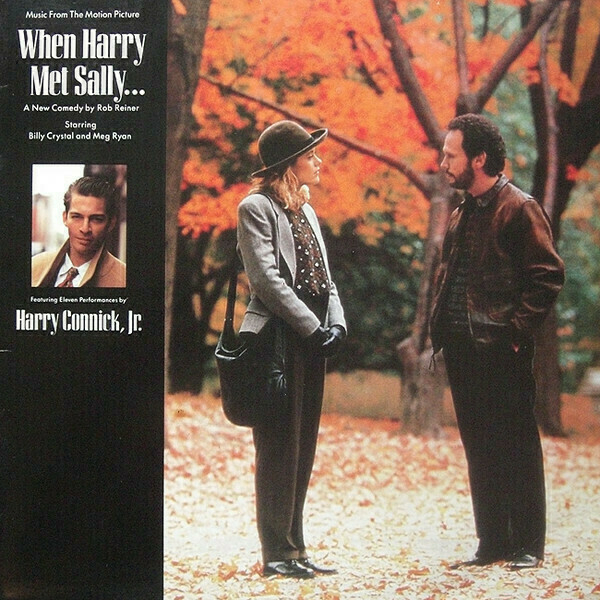
I got tagged on Facebook to do this project – share ten albums that greatly influenced my taste in music. One album per day for ten consecutive days. In theory for the Facebook version this is supposed to be without explanation… but I want to explain! So I’m going to blog the explanations here.
So far I’ve shared my entry into classical and then my entry into Christian pop music. Now it’s time to get to my other musical love: jazz. I don’t remember which friend introduced me to this record, but it take me long to get hooked. I wouldn’t see When Harry Met Sally, the movie, for another decade, but this soundtrack hit my sweet spot. Full of jazz standards (It Had to be You, Don’t Get Around Much Any More, Stompin’ At the Savoy, Where or When), arranged by a 22-year-old up and coming jazz pianist named Harry Connick, Jr., with a rollicking stride piano version of Winter Wonderland in the middle… could you design an album more perfectly to appeal to teenaged me?
This is one of the records I know every note of. Each hit of each arrangement, every bend in the sax solo on It Had To Be You, and every one of Connick’s New Orleans-inspired alterations to Let’s Call The Whole Thing Off (“I say urster, you say oyster… I’m not gonna stop eating ursters just ‘cause you say oyster… let’s call the whole thing off.”), this record is traced indelibly across my brain.
Eventually I listened to more Connick, and then expanded my jazz horizons with Miles Davis, John Coltrane, and Thelonious Monk, but this was where it started for me.
10 Albums, 10 Days: Go West Young Man

I got tagged on Facebook to do this project – share ten albums that greatly influenced my taste in music. One album per day for ten consecutive days. In theory for the Facebook version this is supposed to be without explanation… but I want to explain! So I’m going to blog the explanations here.
This one’s kind of embarrassing so I’ll get it out of the way early in my series. As I noted yesterday, my early music was mostly classical. But 1990 was a significant year for me. I turned 13. My family moved from Nebraska to Texas. And somewhere along the way, I bought my first Christian pop album - Michael W. Smith’s Go West Young Man.
Listening back to it now, it’s not great. Definitely not MWS’ best record, and not my favorite of his as I look back on his discography now. But for 13-year-old me, it was groundbreaking to get into pop music. Electric guitars. Power ballads. An inadvisable rap verse to Love Crusade. I learned the ballads on the piano. My mother despaired for a while that I would just try to sound like MWS instead of finding my natural singing voice.
Sooner or later I’d get past the singing voice, but 30 years later I’m still singing at the piano. And if for some reason I stumble across the unmistakable first two chords from Place In This World, I’m suddenly back in 1990.
10 Albums, 10 Days: Rach 2
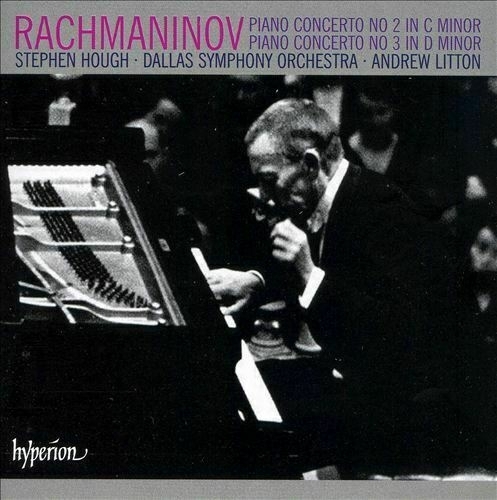
I got tagged on Facebook to do this project - share ten albums that greatly influenced my taste in music. One album per day for ten consecutive days. In theory for the Facebook version this is supposed to be without explanation… but I want to explain! So I’m going to blog the explanations here.
I will say I found it a challenge to assemble the list not as ten favorite albums but ten influential albums. Since I’m a musician myself, I really tried to pick albums that were formative for me as a musician, though a few of them slipped in that were formative for other reasons. I’m also going to try to be somewhat chronological since these are a part of my story.
I’ll start today with what formed me early - classical music. My parents’ love for classical music rubbed off on me. I still have memories of my dad (who spent several years early in life as a high school band director) standing in front of the stereo conducting along to recordings of Beethoven symphonies. I started taking piano lessons at age 7 and continued through high school. But the first bit of classical music that latched on to me in a really significant way was Rachmaninov’s second piano concerto.
I don’t remember the specific recording I listened to as a kid. I know it was on a cassette tape (remember those?) which I probably bought at Walmart. Rachmaninov hits the sweet spot on the classical to modern spectrum for me. Still strongly influenced by the late Romantic composers, tinges of the modern influences that his Russian counterparts would more fully embrace, but beautiful melodies and lush harmonies that are well suited for pianists with large hands. I hacked through a lot of this concerto in junior high and high school and while I never got very good at it I enjoyed it immensely.
The recording I’m sharing of it today is one that has become one of my favorites - Stephen Hough with the Dallas Symphony Orchestra. It’s fairly fast and rowdy compared to most other versions you hear. I think Sergei might approve. Unfortunately it doesn’t appear to be on any of the streaming services. There is this YouTube video though of Hough talking about his new recording and playing a bit of it.
Current Earworm
I’m accompanying a local friend who’s a high school senior when he sings for state contest in a couple weeks. I have now had this song he’s singing stuck in my head since last Sunday night. “Vagabond”, with text by Robert Louis Stevenson and music by Ralph Vaughan Williams.
There are worse earworms, I guess, but that little bum-padump-pa-dah signature is starting to wear on me…
Fans with Bands
I went down a little bit of a YouTube rat hole the other day watching a playlist full of videos where musician fans of big artists get pulled up on stage to play with the band. It started here:
Which in the replies led me to this playlist:
Some of them are a little too obviously pre-planned - the 11-year-old who magically ends up on stage with Carrie Underwood has her own YouTube channel with 30,000 followers - but most of them are genuinely delightful.
For instance, this one where a teenager joins Bruce Springsteen on stage to sing “Growin’ Up”:
Or the college kid here who boldly asks Billy Joel to sing “New York State of Mind” while the kid plays the piano, and proceeds to win Joel’s grudging respect:
But hands down, the winner in these has to be anybody singing the “For Good” duet with Kristen Chenowith. There must be a dozen of these on YouTube. And why not? It’s a beautiful song, just challenging enough to let a good vocalist shine, some nice harmonies. And Chenowith is a generous performer, encouraging her amateur counterparts, guiding them along through the song, and seeming to genuinely enjoy the experience. Here’s an example:
I think I love these so much because you see momentary flashes of the true joy of making music together, and you get reminded that while a lucky (and very talented) few make it big, there are talented musicians everywhere who could, on a given night, step in and hold their own with their favorite band.
As a musician myself you can bet I’ve had idle daydreams where I was in this sort of scenario myself. But even though I’d give my eye teeth to do the Behold the Lamb of God Christmas show with Andrew Peterson and gang, it always seems uncharitable to wish that Ben Shive would break his hand and need an impromptu replacement. (But if he ever does, Andrew, give me a call, eh?)
Making the rounds...
I’ve been playing music in church since high school and as a member of worship bands at least since college, and have played most all the instruments on the team save for electric guitar, but yesterday was a new one for me: I’ve never had this view before for a full worship service.

The worship team was short a drummer for the week; with the middle daughter now taking drum lessons I have an electronic kit at home that I can practice on.
It was really a lot of fun. My goal was to practice enough that I didn’t embarrass myself, and I think I managed that. To be fair, the songs were relatively easy. Still, I hope they let me do it again sometime.
For All The Saints
This great hymn was sung at the end of President George H. W. Bush’s funeral this morning. Written by Anglican priest William Walsham How in 1864, I’m always drawn to how it gets the sentiments of a Christian funeral so right.
(The typical hymn tune setting SINE NOMINE by Ralph Vaughan Williams doesn’t hurt anything, either, though I do remember struggling mightily to play it unrehearsed as a teenaged church pianist.)
For all the saints who from their labors rest,
who Thee by faith before the world confessed;
Thy name, O Jesus, be forever blest.
Alleluia, Alleluia!
Thou wast their Rock, their Fortress, and their Might;
Thou, Lord, their Captain in the well-fought fight;
Thou, in the darkness drear, their one true Light.
Alleluia, Alleluia!
O blest communion, fellowship divine!
We feebly struggle, they in glory shine;
yet all are one in Thee, for all are Thine.
Alleluia, Alleluia!
And when the strife is fierce, the warfare long,
steals on the ear the distant triumph song,
and hearts are brave again, and arms are strong.
Alleluia, Alleluia!
But when there breaks a yet more glorious day;
the saints triumphant rise in bright array;
the King of glory passes on His way. Alleluia, Alleluia!
From earth’s wide bounds, from ocean’s farthest coast,
through gates of pearl streams in the countless host,
in praise of Father, Son, and Holy Ghost.
Alleluia, Alleluia!